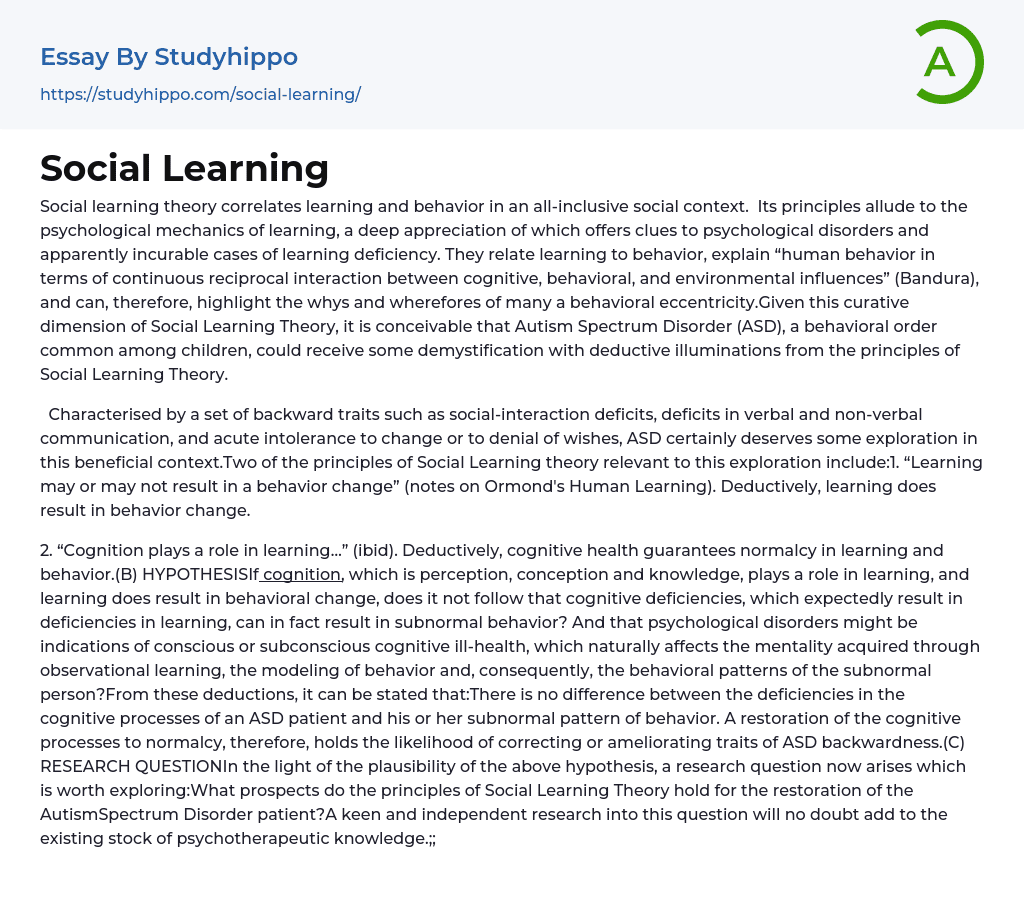Social Learning Theory is an inclusive approach that connects learning with behavior within a social context. By understanding the psychology behind learning, it can provide insight into seemingly incurable learning deficiencies and psychological disorders. The theory suggests that behavior is influenced by continuous interaction between cognitive, behavioral, and environmental factors, which can explain various behavioral anomalies. Therefore, Social Learning Theory can potentially demystify Autism Spectrum Disorder (ASD), a prevalent behavioral disorder in children, by using its principles to provide deductive explanations.
ASD, with its characteristic traits such as deficits in social interaction, communication, and intolerance to change or denial of wishes, requires exploration in this context. Two principles of the Social Learning theory that are relevant to this exploration are: 1. "Learning may or may not result in a behavior change" (according to notes on Ormond's Human Learning).
...This principle deductively suggests that learning does result in behavior change.
2. According to the source (ibid), learning is influenced by cognition. Therefore, the normalcy of learning and behavior is dependent on cognitive health (B). If cognitive deficiencies result in deficiencies in learning and subnormal behavior, could psychological disorders indicate conscious or subconscious cognitive ill-health that impacts the behavior acquired through observational learning and modeling? Consequently, the behavioral patterns of subnormal individuals might be a result of cognitive deficiencies. From these deductions, it can be concluded that there is no difference between cognitive deficiencies in ASD patients and their subnormal behavior. Restoring cognitive processes to normalcy can ameliorate ASD traits of backwardness. (C) In light of this hypothesis, an important research question arises: What are the prospects for using Social Learning Theory principles to restore ASD patients? Independent
research in this area can contribute significantly to psychotherapeutic knowledge.
- Perseverance essays
- Expressive essays
- Character Traits essays
- Apology essays
- Compassion essays
- Interpretation essays
- Plagiarism essays
- Analogy essays
- Learning English essays
- Adult essays
- Aggression essays
- Altruism essays
- Archetype essays
- Behavior essays
- Certainty essays
- Conformity essays
- Deception essays
- Human Behavior essays
- Human Sexuality essays
- Maturity essays
- Morality essays
- Obedience essays
- Procrastination essays
- Reinforcement essays
- Role Model essays
- Coaching essays
- Critical Thinking essays
- homework essays
- Learning essays
- Library essays
- Listening essays
- Literacy essays
- Mentor essays
- Physical Education essays
- Project essays
- Reading essays
- Research essays
- Sex Education essays
- Social Studies essays
- Standardized Testing essays
- Study Plan essays
- Teaching essays
- Cultural Appropriation essays
- Double Consciousness essays
- Social Learning Theory essays
- Systems Theory essays




